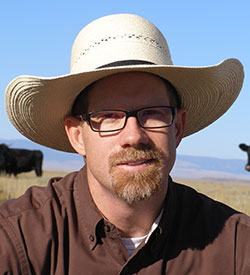UW Part of $19M Project to Understand How Range Management Affects Soil Health, Producer Well
Published December 08, 2021

The University of Wyoming is among an international coalition that announced a $19 million research project aimed at understanding how a farmer’s or a rancher’s grazing management decisions affect soil health on pasture and rangeland.
The research will help determine how soil health can benefit a producer’s land and well-being. Noble Research Institute, UW, Michigan State University and Colorado State University are leaders of the project.
Titled “Metrics, Management and Monitoring: An Investigation of Pasture and Rangeland Soil Health and its Drivers,” the project was announced Tuesday, Dec. 7, at the National Grazing Lands Coalition triennial meeting in Myrtle Beach, S.C.
UW Extension range specialist Derek Scasta says the funding will help accomplish several important considerations for Wyoming ranch management.
The project will bring UW’s McGuire Ranch online as a top-tier research resource by supporting the development of needed fencing and water to do applied grazing research, he says.
“It will allow for the dissemination of resources around the state with producers to create a pipeline of soil, forage and livestock-focused information,” Scasta says. “In addition to the Wyoming-specific work, this funding also will position UW among a group of research collaborators around the world to enhance our understanding of sustainable ranch practices.”
The Foundation for Food & Agriculture Research awarded Noble Research Institute a $9.5 million grant to lead this work. Noble Research Institute is providing $7.5 million to this project, with additional financial contributions by Greenacres Foundation, The Jones Family Foundation and ButcherBox.
For decades, farmers and ranchers who have implemented soil health principles have improved the overall health of their land and have experienced more profitable operations. However, these observations have been -- to this point -- largely anecdotal, according to Noble Research Institute.
This research will quantify these observations and examine how management decisions on grazing lands are connected to the overall health of the ecosystem, including the social and economic well-being of the farmer, rancher and land manager.
The project will provide farmers and ranchers tools that simply and accurately measure outcomes of soil health in grazing land environments to guide management decisions and quantify the impact of intentional management, according to Noble Research Institute. Measuring soil health requires techniques that are often site-specific and costly for ranchers.
The project explores why some producers adopt soil health building principles, such as adaptive grazing management, while others do not. It also examines social and economic sustainability (producer well-being), which have rarely been studied in agriculture or, in particular, livestock agriculture.
The project brings together researchers from 11 nonprofit organizations, for-profit businesses, private research institutes and public universities in the United States and the United Kingdom. Collaborators include Oregon State University, the National Grazing Lands Coalition, the U.S. Department of Agriculture-Agricultural Research Service (Maryland, Colorado and Wyoming), Savory Institute, Snaplands LLC, The Nature Conservancy and the United Kingdom’s Quanterra Systems.

